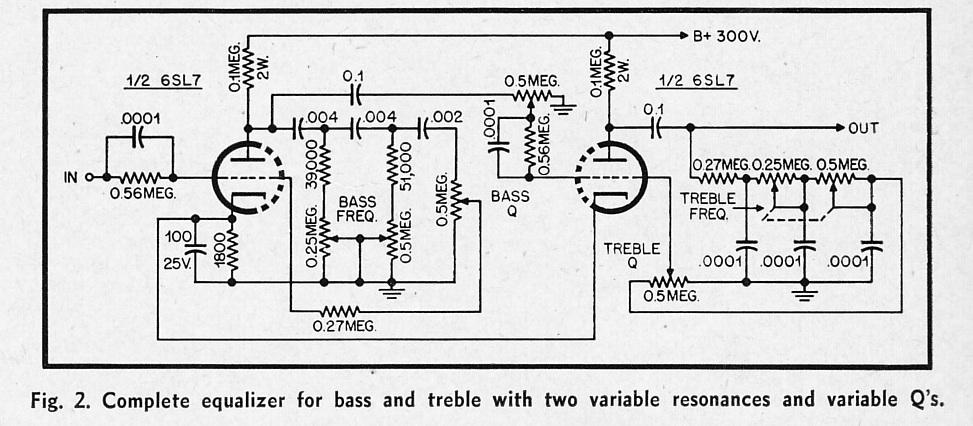 Circuit for a simple bass/treble parametric equalizer that uses no inductors. Could be a useful piece. Not sure if 250k/500k dual pots are still available? Since I have still not finished building the last tube EQ project that I described, so I’m not likely to craft this thing anytime soon. If anyone out there picks this up and builds one, LMK…
Circuit for a simple bass/treble parametric equalizer that uses no inductors. Could be a useful piece. Not sure if 250k/500k dual pots are still available? Since I have still not finished building the last tube EQ project that I described, so I’m not likely to craft this thing anytime soon. If anyone out there picks this up and builds one, LMK…
Going back to AUDIO magazine in the early 50s: a few circuits that caught my eye. As always, if any of y’all out there build any of these, drop us a line and let us know how it went.
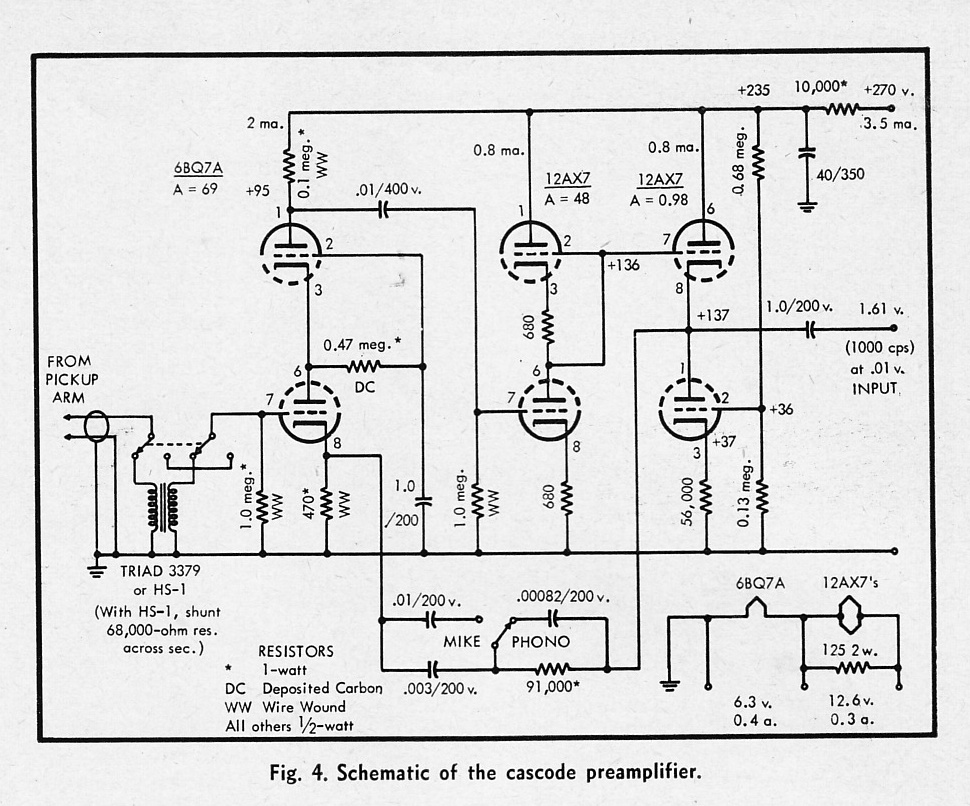 A ‘cascode’ preamp which features very high gain and defeatable compensation for phono cartridge. I am not aware of any available mic preamp that uses this circuit. a lot of gain available here…
A ‘cascode’ preamp which features very high gain and defeatable compensation for phono cartridge. I am not aware of any available mic preamp that uses this circuit. a lot of gain available here…
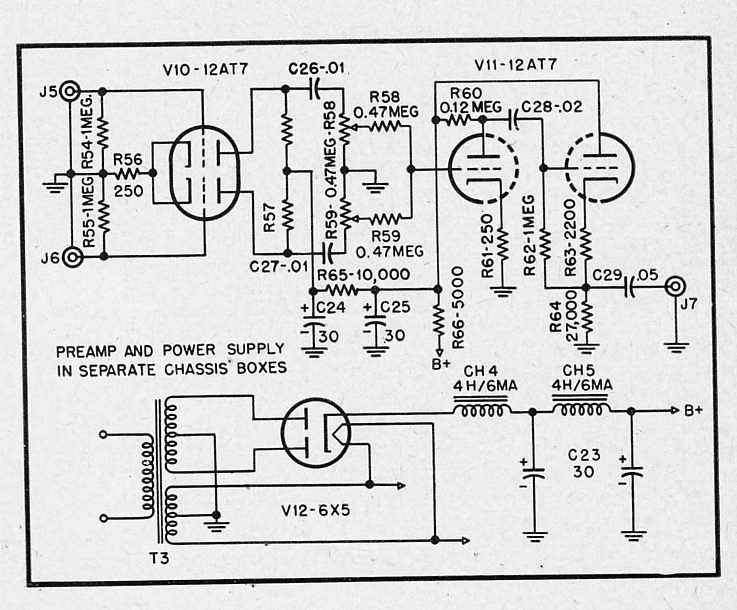 A low-gain preamp that mixes two high-impedance signals to a medium-impedance output. Add a few transformers (500: 50K inputs, 15k:600 output) and this could be a useful tool for selecting/blending two mic signals to one track of (tape). IE put a couple of mics on a gtr amp, blend to taste… I generally do this using submasters (busses) on the console but here’s a potential way to do it that uses a much simpler signal path, IE right from the mics into the convertor (or tape machine).
A low-gain preamp that mixes two high-impedance signals to a medium-impedance output. Add a few transformers (500: 50K inputs, 15k:600 output) and this could be a useful tool for selecting/blending two mic signals to one track of (tape). IE put a couple of mics on a gtr amp, blend to taste… I generally do this using submasters (busses) on the console but here’s a potential way to do it that uses a much simpler signal path, IE right from the mics into the convertor (or tape machine).
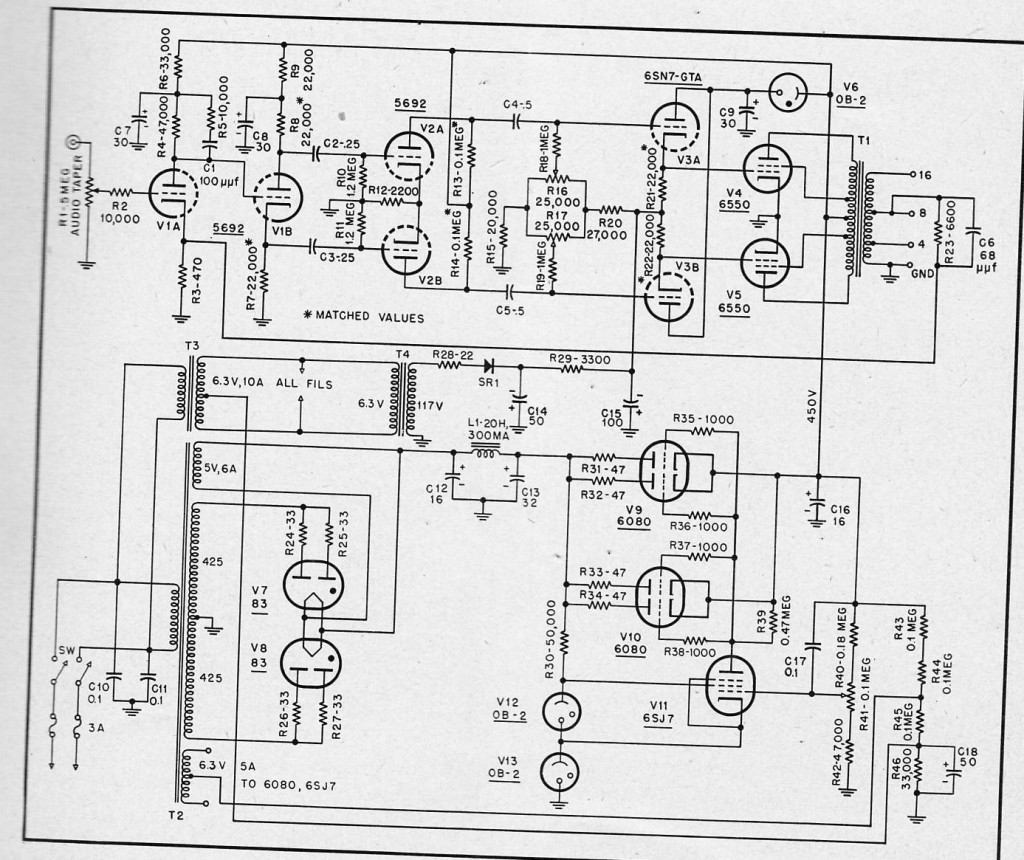 A 50-watt ultralinear power amp using 6550 power tubes
A 50-watt ultralinear power amp using 6550 power tubes
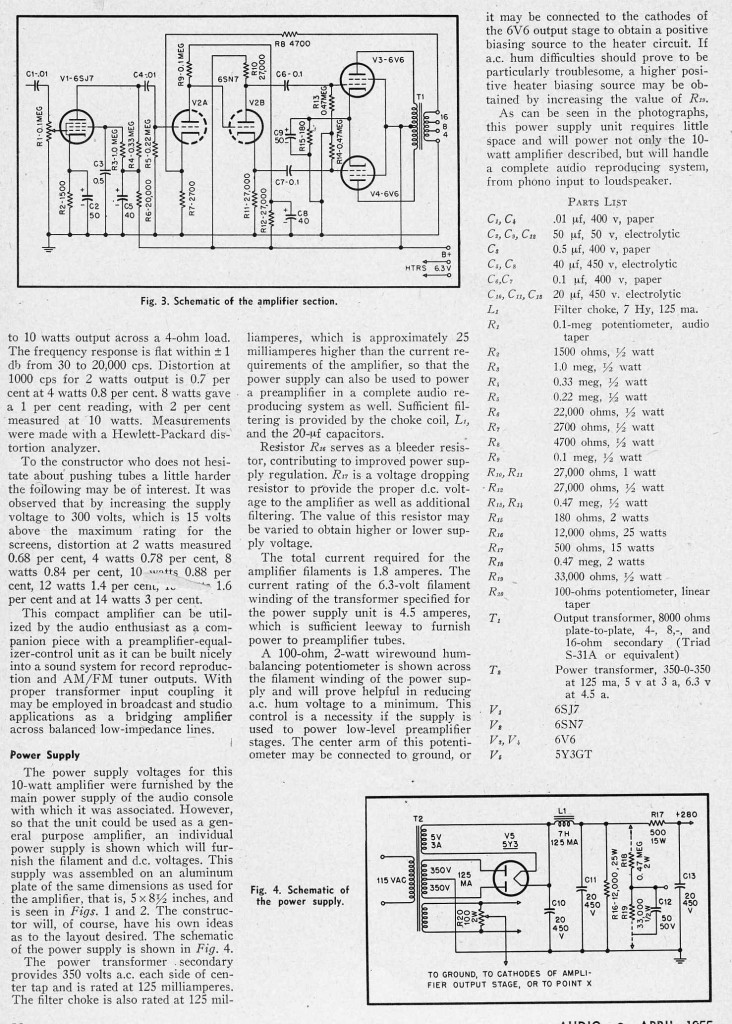 A 12-watt 6V6 power amp with some negative feedback and a pentode input stage.
A 12-watt 6V6 power amp with some negative feedback and a pentode input stage.
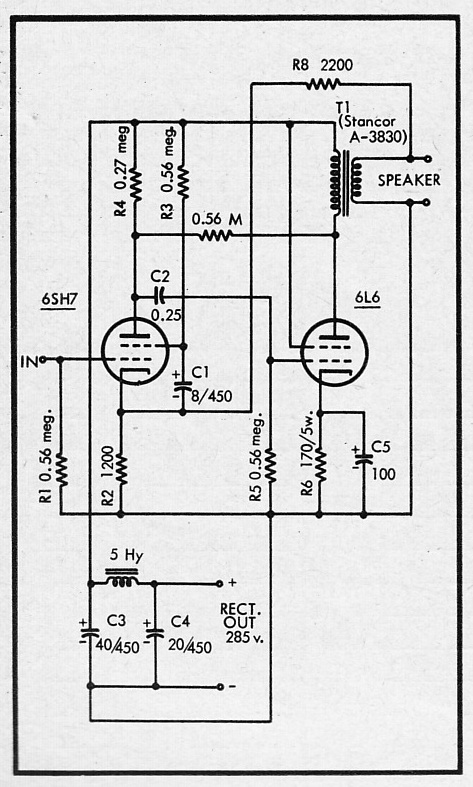 A simple 8-watt power amp that uses a 6SH7 input tube and a single 6L6 output. This circuit uses a great deal of negative feedback in order to supposedly get more linear response with cheap output transformers. I’ve never used the 6SH7 tube before… curious though.
A simple 8-watt power amp that uses a 6SH7 input tube and a single 6L6 output. This circuit uses a great deal of negative feedback in order to supposedly get more linear response with cheap output transformers. I’ve never used the 6SH7 tube before… curious though.
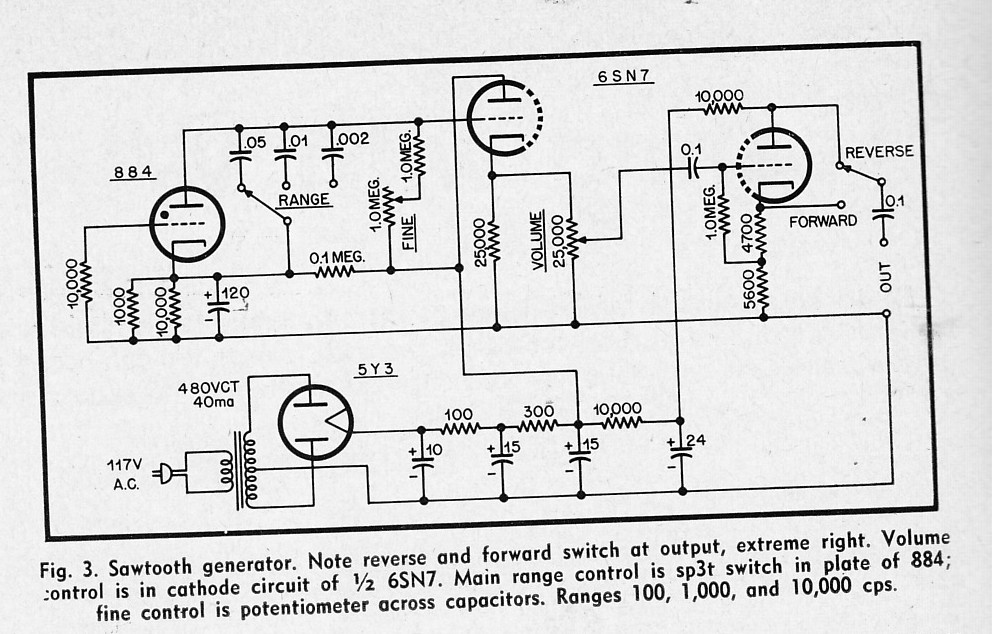 A simple design for a variable sawtooth wave generator.
A simple design for a variable sawtooth wave generator.
13 replies on “A Few Interesting DIY Audio Projects c. 1955”
Hey Chris, I have been looking everywhere for a fully-parametric tube eq schematic, thanks a LOT for posting this. And only one tube…sweet! I will definitely be building this thing. One thought i have is regarding boost/cut – i see the lone .5meg pot going to the grid of V2 (top left of v2) and i assume that’s boost-cut for the bass stage, any ideas on that and on adding a boost-cut for the treble stage?
Ed Dell of Audio Amateur/Glass Audio/AudioXPress has reprinted both the old Audio Anthologies and every issue of the old Audiocraft magazine, but it would be great if we could buy complete sets of “Audio” in .pdf form on dvd-rom.
Im interesting for Historical Tube schematic.
Germany
many of the old issues of Audio Engineering, later to become Audio Magazine, and High Fidelity and Record Reviews can be found at:
http://vintagevacuumaudio.com/magazines-1952-1962/
the collection isn’t totally complete, but it is there and it can be downloaded. Lots of good stuff there. It’s a sad reminder of what magazine content USED to be.
Caveat: the files are locked, so they can’t be printed or extracted.
I haven’t looked, but there is a way to donate to their cause, and this might gain you the ability to unlock these files. Also, their web page code deliberately makes it a bit difficult to download issues and save them… but it can be done.
A couple of questions about the Low Gain Preamp that mixes two signals into one:
1. What is the B+ I figure about 200-300V DC at 20mA tops.
2. What is the value of R57? I figure about 100 – 220K
hi steve. re: B+ : yes 250V or therabouts is good for this. 20ma should be more than enough, considering that the designer spec’d chokes rated at 6ma.
re: plate resistors for the input stage: that is a very good question! I have never seen a 12AT7 section with a 500 ohm bias resistor (ie two stages sharing a common 250 ohm bias resistor) so I have no idea. check the curves in a tube manual and see what the plate resistor should be when using a 500 ohm cathode bias.
good luck, c.
Silly me the answer is in the circuit diagram check out R61 which is 250R and R60 equals 120K. Which is about the ball park figure I thought it would be, I could always do the maths and work it out.
The EQ looks like the boost and Q are affected by the same control. It also appears that there is a resistor missing on the treble Q wiper going to the grid.
The 50 watt ultralinear looks pretty sick with the regulated B+. SR1 is shown backwards though. I may build a pair of these when I get around to winding the transformers.
Chris, I looked for the original article detailing the Fig. 2 Equalizer, but could not locate it. I am just finishing a 6SL7 project, Ampeg B-15 Preamp and am looking at this as a possible bass guitar compressor on the front end. Can you tell me exactly where you found it? Thanks, J
Do you recall which issue of the Audio magazine that the 6550 ultralinear amplifier shown above came from? I could not seem to find the article where the scheamtic was taken from…
Thanks,
https://www.preservationsound.com/wp-content/uploads/2011/05/6550_hifi_amp-1024×860.jpg
no clue, srry
gud day sir,… may i know what is the issue of the equalizer for bass and treble with two variable resonances diagram with no inductors, thanks